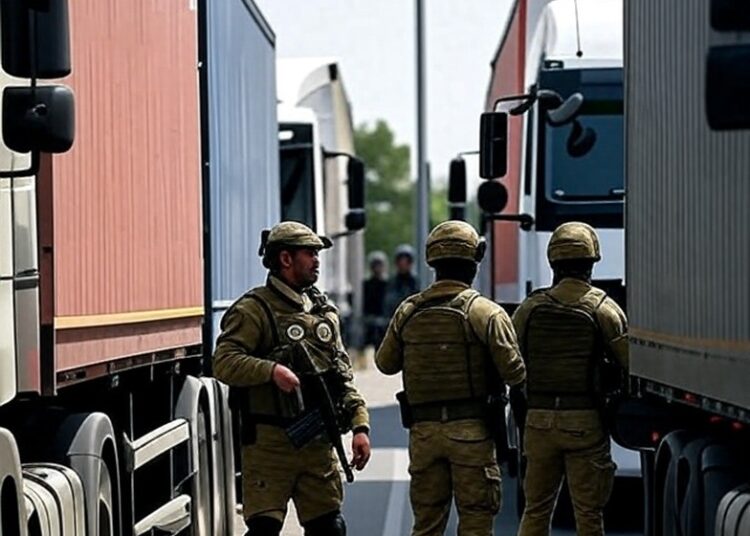Abdullah Bozkurt/Stockholm
A ruling by Turkey’s top criminal bench has quietly vacated two major convictions connected to a notorious underworld figure Sami Hoştan long accused of working with Turkey’s clandestine military-intelligence outfit, turning what German courts treated as a seamless trafficking pipeline into a fragmented Turkish case blunted by deadlines and doctrinal hairsplitting.
On March 20, 2024, the Supreme Court of Appeals’ (Yargitay) Plenary Criminal Chamber (Ceza Genel Kurulu) decided that suspects in two large heroin consignments seized at the German border on October 25 and 31, 1991, could no longer be punished in Turkey because the statute of limitations expired in 2006.
The chamber ordered that those counts be dismissed outright while refusing to treat a later 105-kilogram shipment intercepted on July 30, 1992, as part of the same “zincirleme suç” (chain crime). Instead, it re-labeled that episode as a separate offense emanating from a fresh criminal conspiracy, thus neatly sidestepping the chain that prosecutors argued linked the 1991 and 1992 runs.
By severing the 1992 shipment from the 1991 seizures, the court prevented the more recent count from reviving or preserving the older ones. And by applying the statute of limitations, the chamber guaranteed that the 1991 counts — already old when the Istanbul 9th High Criminal Court handed down convictions in April 2006 — were barred by time as of October 31, 2006. Eighteen years later, the high court has now formalized that outcome and wiped the slate clean on those episodes.
In addition to Hoştan, the original indictment named nine defendants, among them Hacı Murat Özdemir, Rıfat Aksoy, Ökkeş Koylan, Nafiz Orak, Cuma Orhan, İrfan Çulu, Hüseyin Göy, Doğan Koylan and Hakkı Aksoy. Court files and testimony show the group operated a logistics web using Turkish trucking companies to conceal heroin in legitimate exports to Germany and the Netherlands.
The ruling by Turkey’s Supreme Court of Appeals effectively terminated a long-running drug trafficking case involving heroin shipments from Turkey to Germany and the Netherlands:
Among them, Hoştan stood out as the most notorious criminal boss. Nicknamed “Arnavut Sami” (Sami the Albanian), he was identified in Turkish parliamentary reports and court filings as a fixer linking organized crime, security services and political figures. During the 1990s Hoştan allegedly cooperated with JİTEM — the gendarmerie’s covert intelligence and counterinsurgency wing — whose operatives were accused of running drug routes through southeastern Turkey to finance off-book operations against Kurdish insurgents.
His boss was Brig. Gen. Veli Küçük, the former gendarmerie officer who once headed JİTEM. Hoştan also maintained close ties with Mehmet Kemal Ağar, a former police chief and interior minister who now oversees major organized crime networks in Turkey and helps President Recep Tayyip Erdogan maintain control of the streets through allied gangs. Serious criminal cases backed by overwhelming evidence against both Küçük and Ağar were quietly buried by Erdogan’s government following political interference in the judiciary.
Likewise, despite facing multiple investigations for drug trafficking, murder and corruption, Hoştan enjoyed near-total impunity until his death in 2015. Even posthumously, he was spared accountability when Turkey’s Supreme Court of Appeals allowed the 1991–1992 heroin-export case to collapse under procedural leniency, vacating his 15-year prison sentence on the grounds that too much time had passed.
The drug file reads like a blueprint of the Turkey-to-EU narcotics corridor of the 1990s, which partly helped Turkish intelligence to raise funds for clandestine operations: 91 packages hidden in a spare tire on a textiles truck that left Turkey on October 20, 1991, and entered Germany via Waidhaus on October 25, 1991; 184 packages stashed in three spare tires on a Turkish glassware truck five days later at Wald/Schafberg De Furth; and nine months later 125 packages bundled in sports bags inside a Mercedes-Benz leaving Burgsteinfurt for the Netherlands on July 30, 1992.
German courts moved quickly in the early 1990s, handing down prison sentences to several co-defendants in 1992 and 1994. The Weiden Regional Court on June 10, 1992, handed down eight and three-year sentences to two traffickers; the Regensburg Regional Court on July 6, 1992, imposed a 14-year sentence on another; and the Münster District Court on September 30, 1994, sentenced a further suspect to 10 years in prison for drug trafficking.

All these convictions became final between June 18, 1992 and January 31, 1995, highlighting how German authorities concluded prosecutions within months, while the Turkish cases dragged on for decades.
In Turkey the case continued for years through appeals, corrections and objections, culminating in the chamber’s 2024 ruling that eliminates the earliest, most heavily documented pieces.
The court’s reasoning hinged on a fresh criminal conspiracy and timing. Under Article 43 of the Turkish Penal Code (TCK), a “chain crime” allows multiple acts to be treated as a single offense if they stem from one continuous criminal plan. Yet in this case, although prosecutors, police investigators and the trial judges all concluded that the shipments were part of the same criminal enterprise, the Supreme Court of Appeals disagreed. Testimony from Doğan Koylan, one of the defendants, directly implicated Hoştan as one of the owners of the seized heroin, reinforcing investigators’ view that the operations were coordinated under a single network.
The chamber studied the nine-month gap between the 1991 and 1992 shipments, the change in participants and the new organization after the earlier seizures and concluded that the 1992 operation reflected a renewed decision, not the continuation of one plan, when in fact all were part of coordinated drug trafficking operations.
As a result the court let the clock do what narcotics traffickers count on it to do in Turkey: run out. The timeline is damning. The core acts date to 1991–1992. The trial court’s first comprehensive judgment arrived only in April 2006, just months before the 15-year “cut-off” for the 1991 counts. The 10th Criminal Chamber largely concurred in January 2007, tweaking the fines but leaving the architecture intact.

It then took until March 2024 — after an objection from the chief public prosecutor’s office and a procedural skirmish over technicalities — for the Plenary Chamber to settle the matter by striking the 1991 counts as barred by time and treating the 1992 episode as a stand-alone crime.
What emerges is a familiar pattern in high-stakes Turkish narcotics litigation: Complex trafficking schemes are deconstructed into atomized episodes; appellate review stretches across decades; and, at the end of the process, the combination of lenient technicalities, chain-crime parsing and no-retrial fixes delivers an outcome that favors finality over accountability.
In a striking contrast with Germany, where border-seizure prosecutions from this very file resulted in final sentences in 1992 and 1994 and the deportation of some Turks after time served in prison, Turkey, where the trafficking was organized and launched, has only now declared much of the conduct too old to punish.
The decision to adopt the most forgiving legal route more than three decades later and to close the case without a new hearing sends a clear message that defendants have long understood: In Turkey’s judicial maze, time itself becomes a defense, provided there is political protection to ensure that powerful criminals walk free with complete impunity.

The file now returns to the lower court for housekeeping in line with the high court’s directives. The traffickers’ message board will register the bottom line more succinctly: Two major shipments are gone on a technicality; the system worked for them.
It is no coincidence that Turkey has emerged as a major hub for international drug trafficking, particularly for cocaine shipments moving toward Europe and the Middle East. The key players in the narcotics trade continue to enjoy political protection under Erdogan’s government, while police forces focus on mass arrests of low-level street dealers instead of pursuing the powerful figures orchestrating the country’s booming drug economy.
In a nation struggling with high unemployment and deepening poverty, especially among youths, drug networks face no shortage of replacements for those arrested. Every jailed street vendor or small courier is quickly substituted, ensuring that the machinery of trafficking, distribution and retail drug sales keeps operating seamlessly — protected from the top, replenished from below.













